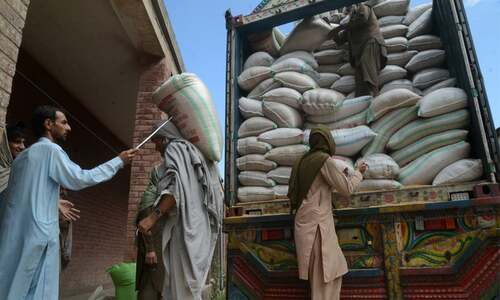KARACHI: Sufi music is keeping alive the culture of sharing in the subcontinent. It is part of the region’s indigenous value system. This was articulated by German scholar Prof Dr Jurgen Wasim Frembgen as he took a breather while reading excerpts from his book ‘Nocturnal Music in the Land of the Sufis — Unheard Pakistan’ at the Goethe Institut Karachi on Wednesday evening.
Introducing himself and the book to a thin audience, Dr Frembgen said he started listening to Indian classical and folk music at a young age in the 1970s. It didn’t take him long to realise that the reaction of German audiences to eastern music was quite different from that of Pakistani music lovers. While the former reacted to it in a reserved manner the latter sat on the floor and appreciated it verbally (wah, wah) and through gestures. It was then that he started working on classical and Sufi music.
“I can’t play any instrument but am a keen listener,” he said.
Speaking on the genesis of the book, Dr Frembgen said he visited the walled city of Lahore quite a bit and sat with musicians and connoisseurs of music in order to observe their understanding of the subject. He claimed Sufi music was a gift to western listeners in order to help them develop their spirituality. He being an anthropologist could train his ear to have a better understanding of the genre. There were several histories of Indian classical music and its comprehension depended upon what kind of cultural setting the music was based. The atmosphere that’s part of the performance (with agarbattis and dhamal) and the concept of sharing were keeping alive the subcontinent’s music that was indigenous to the region’s value system.
Dr Frembgen recalled an event where the established flutist Akmal Qadri was playing raga des (a nighttime raga). This made him read the first chapter of the book in which he remembered his visit to the late classical dancer Maharaj Kathak’s house in Lahore in the 1990s where Ustad Hamid Ali Khan was singing ghazals and thumris. It was not just the singing and admiration for the poets whose poetry was being sung but the whole ambience that inspired him (people touching Maharaj Kathak’s feet or appreciating the couplet with loud gestures etc).
The author then touched upon a sensitive topic. He said today there was a debate raging on about whether music was haram, and with bomb blasts at shrines a political angle had entered the whole scenario. There was a need to accommodate differences and celebrate cultural diversity. His book was not a scholarly one but was a collection of small narratives. Dr Frembgen mentioned the name of Dr Ashfaq, a homeopathic doctor and music expert with whom he had many discussions on the emotional dimension to Sufi music. He read out the chapter in which Akmal Qadri was playing raga des on his bamboo flute and commented that ‘a raga can awaken certain masculine or feminine emotion in the listener’.
Dr Frembgen also spoke on a chapter on Shah Latif’s shrine (which he said had undergone quite a few aesthetic changes unlike other shrines) where six to eight musicians sang till morning. “We need music to console our hearts,” he remarked while lauding those who perform at the great Sufi poet’s shrine. He also briefly discussed the difference in behaviours of people that nowadays visited shrines and argued Sufi tradition was at the heart of Islam.
The last bit that Dr Frembgen read out from the book was his experience of being at Baba Shah Jamal in Lahore. The chapter focused on the different people who indulged in trance dance or dhamal.
Replying to a question put to him by an attendee, Dr Frembgen said the dynamics of change were always at work that was why at some shrines the performances had more of an entertainment value, while when he recently visited an area in Karachi he found members of the Sheedi community trying to search their Sufi identity.














































Dear visitor, the comments section is undergoing an overhaul and will return soon.